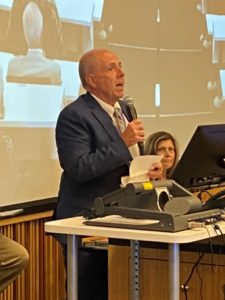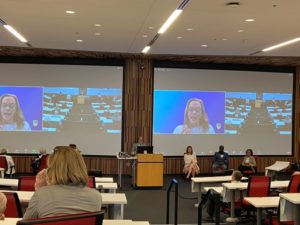America’s Nursing Crisis: Suggestions on What Should Be Done
America’s Nursing Crisis:
Suggestions on What Should Be Done
 Questions were posed leading up to the 28th Annual Rosemary Flanigan Lecture on August 4, 2022:
Questions were posed leading up to the 28th Annual Rosemary Flanigan Lecture on August 4, 2022:
Is “crisis” an accurate description of what nurses and all of us currently are facing?
If so, was this crisis preventable or inevitable given the pandemic?
And, whatever this is, what should be done?
These and other questions were discussed by a panel of 7 nurse leaders with approximately 200 virtual and in-person participants at Kansas City University.
Yes it’s a crisis, here in the U.S. and internationally. Probably it was inevitable and the pandemic merely accentuated it. And indeed, there are a number of actions that should be taken to ameliorate the current nursing crisis.
Keynoter Dr. Karen Cox, President of Chamberlain University, and our other nurse panelists came up with many practical suggestions on how to respond. What should be done? Here are 13 proposed action steps (as compiled by the Center’s Flanigan Chair, Dr. Tarris Rosell, in no particular order):
- Increase compensation for nurses and for nurse educators.

- Provide creative options for nursing practice, such as “virtual nursing” and telehealth, especially for older nurses or those with physical restrictions (e.g., back problems, immuno-compromised, etc.) impeding involvement in direct patient care.
- Maintain safe and sane nurse to patient staffing ratios.
- Fund nursing education better. (A virtual participant who teaches English to immigrants wrote that many of her students would like to train as nurses but lack resources: “One way to solve the nursing shortage would be to support these students financially through ESL and nursing school via scholarships or grants.”)
- Legislatively fix nursing liability threats that were exposed by the Radonda Vaught case.
- Increase nursing diversity by improving access to nursing education for persons of color, including immigrants.
- Create and support pipeline programs to enable and incentivize CNAs to attain nursing degrees.
- Implement systemic fixes so that nurses are no longer treated as commodities.
- Reduce the time and frustration of requisite charting/documentation via electronic medical record enhancements, training on how to chart expeditiously, and more use of scribes (including students and volunteers).
- Provide accessible and affordable childcare options for nurses with children.
- Educate physicians regarding collaborative relationships with nurse colleagues, including how language (e.g., “my nurse”) can be experienced as demeaning.
- Utilize concepts for normative and regular on-the-job debriefing, such as Schwartz Rounds and “Comfort Corner” (one hospital’s innovation), in addition to other coping strategies being taught to stressed out nurses.
- Provide opportunities for nurses’ voices to be heard, in and outside of clinical settings, and train clinical ethicists more often to consider how ethics recommendations or decisions impact the nurses caring for patients and families involved.
These are not simple fixes, by any means. But a crisis situation calls for immediate and extraordinary response. The Center for Practical Bioethics stands with our nursing colleagues everywhere in a call for action in this time of crisis.
Lecture Recording
Lecture Pictures
Make an impact
Every dollar you give helps providers, clinicians, patients and families decide what to do when it’s hard to agree about the “right” thing to do.









